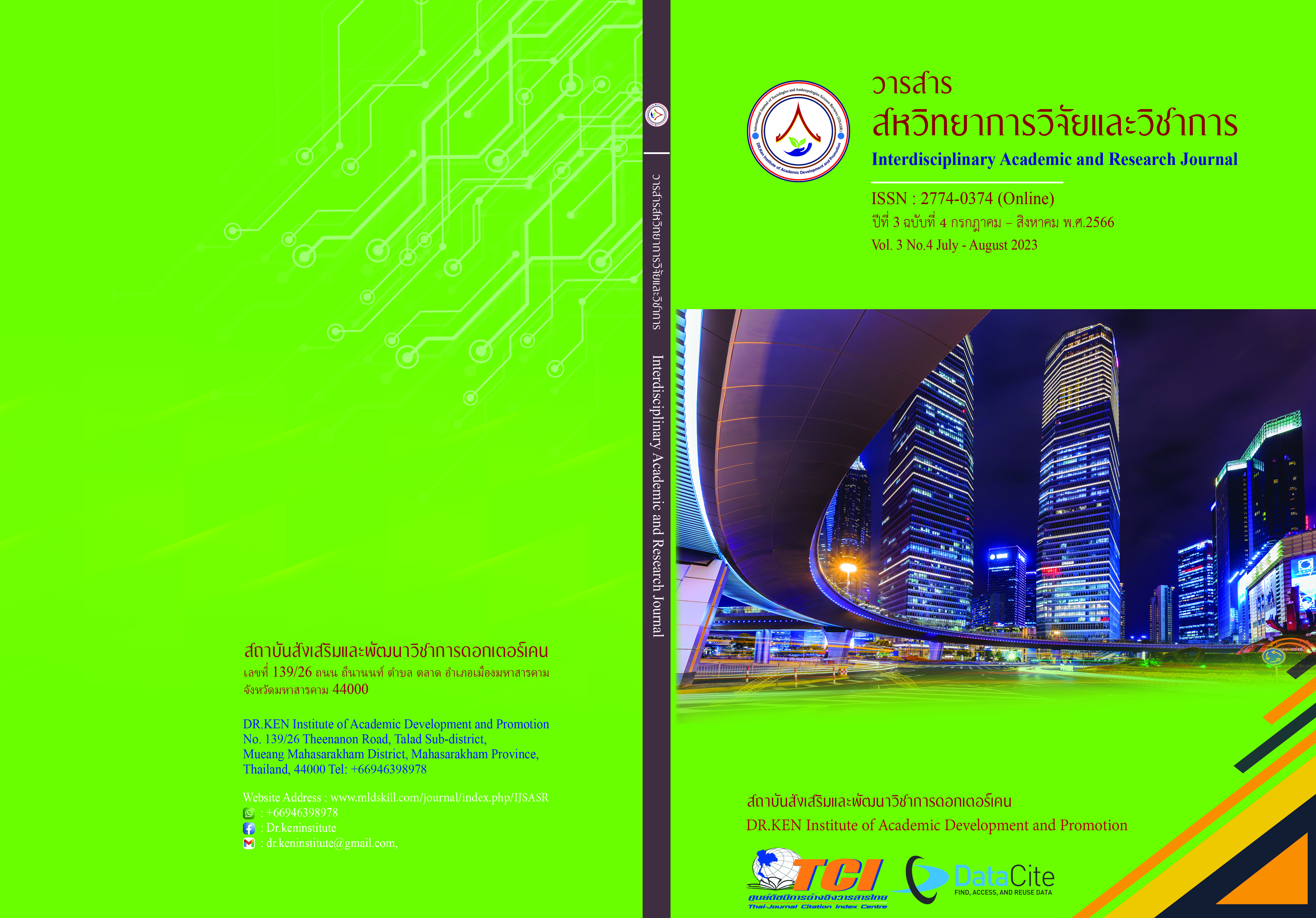The Results of Unfinished Storytelling Activities for the Development of Computational Thinking and Coding in Early Childhood
DOI:
https://doi.org/10.14456/iarj.2023.231Keywords:
Unfinished Storytelling Activities; , Computational Thinking; , Coding; , Public MediaAbstract
The results of unfinished storytelling activities for the development of computational thinking and coding in early childhood, the purpose of this research was to compare the computational thinking and coding of early childhood children before and after receiving the unfinished storytelling activities. The target group was 23 male and female children aged between 4 - 5 years old, studying in kindergarten level 2, semester 2, the academic year 2022, Watpunjathayikawas School under the Pathumthani Primary Educational Service Area Office 2, Ministry of Education. The research tools used in the study were 24 plans of unfinished storytelling activities for developing computational thinking and coding in early childhood and an assessment form of computational thinking and coding in early childhood. Data were analyzed by mean, standard deviation, and content analysis. The study's results revealed that early childhood children who received unfinished storytelling activities had higher post-experimental computational thinking and coding averages than before the experiment. The average score before the experiment was 13.30, and the standard deviation was 4.47, after the experiment, the average score was 25.08, and the standard deviation was 3.21. It was found that the most developed aspect is the algorithm and coding, followed by decomposition, pattern recognition, and abstraction respectively.
References
กิตติพงษ์ พุ่มพวง. (2558). การจัดกิจกรรมการเรียนรู้ ด้วยทฤษฎีเชื่อมโยงความรู้ (Connectivism) ผ่านสื่อ สังคมออนไลน์. วารสารศิลปศาสตร์ปริทัศน์ 10(19), 1-13.
กุลยา ตันติผลาชีวะ. (2541). การเล่านิทาน. วารสารการศึกษาปฐมวัย. 2(2),10-19.
ชนัสนันท์ กัญชนะ. (2565). การพัฒนาเกมการศึกษาเพื่อส่งเสริมทักษะพื้นฐานทางคณิตศาสตร์และทักษะการคิดเชิงคำนวณสำหรับเด็กปฐมวัย. ปริญญาการศึกษามหาบัณฑิต: มหาวิทยาลัยพะเยา.
บุญชม ศรีสะอาด และ มานิต สิทธิพร. (2566). การวิจัยเกี่ยวกับมาตราส่วนประมาณค่า (Rating Scale). Retrieved on June 26, 2023, from https://so02.tci-thaijo.org/index.php/jemmsu/article/download/154477/112393/419050
ไพฑูรย์ โพธิสาร. (2566). มาตราวัดลิเคิร์ท. Retrieved on June 26, 2023, from https://ejournals.swu.ac.th/index.php/ENEDU/article/download/5830/5467/18905
รัตติกาล จตุพรเทียนชัย. (2564). ผลการจัดกิจกรรมการเรียนรู้การคิดเชิงคำนวณที่มีต่อความสามารถด้าน การคิดแก้ปัญหาสำหรับนักเรียนระดับปฐมวัย. วารสารนวัตกรรมการศึกษาและการวิจัย 6(2), 366-380.
วิชัย ดิสสระ. (2535). การพัฒนาหลักสูตรและการสอน. กรุงเทพฯ : สุวีริยาสาส์น.
สถาบันส่งเสริมการสอนวิทยาศาสตร์และเทคโนโลยี. (2563). กรอบการเรียนรู้และแนวทางการจัดประสบการณ์การเรียนรู้บูรณาการวิทยาศาสตร์ เทคโนโลยี และคณิตศาสตร์ ในระดับปฐมวัย ตามหลักสูตรการศึกษาปฐมวัย พุทธศักราช 2560. กรุงเทพฯ: โกโกพริ้นท์ (ไทยแลนด์).
สมชาย รัตนทองคำ. (2556). เอกสารประกอบการสอน 475788 การสอนทางกายภาพบำบัด ภาคต้น ปีการศึกษา 2556. Retrieved on January 12, 2023, from https://ams.kku.ac.th/aalearn/resource/edoc/tech/56web/4learn_edu56.pdf
สำนักงานคณะกรรมการการศึกษาขั้นพื้นฐาน กระทรวงศึกษาธิการ. (2563). หลักสูตรอบรมการจัดกิจกรรม การเรียนรู้วิทยาการคำนวณระดับอนุบาล. Retrieved on November 15, 2022, from http://academic.obec.go.th/web/images/document/1590999209_d_1.pdf
Arora, N. (2022). 8 Effective & Engaging Storytelling Techniques For Teachers. Retrieved on November 15, 2022, from: https://www.piggyride.com/blog/8-effective-engaging-storytelling-techniques-for-teachers/
Muryanti, E. & Herman, Y. (2017). Building Children's Critical Thinking by Puzzle Story Telling. Conference: 3rd International Conference on Early Childhood Education (ICECE 2016). DOI:10.2991/icece-16.2017.25
Unicef Thailand. (2019). Education for the 21st Century. Retrieved on January 20, 2023, from https://www.unicef.org/thailand/th/stories/การศึกษาสำหรับศตวรรษที่-21
Downloads
Published
How to Cite
Issue
Section
License
Copyright (c) 2023 Chuleekorn Yonwilat, Pensri Sawangchareon, Oraphan Butkatunyoo

This work is licensed under a Creative Commons Attribution-NonCommercial-NoDerivatives 4.0 International License.
Copyright on any article in the Interdisciplinary Academic and Research Journal is retained by the author(s) under the under the Creative Commons Attribution-NonCommercial-NoDerivatives 4.0 International License. Permission to use text, content, images, etc. of publication. Any user to read, download, copy, distribute, print, search, or link to the full texts of articles, crawl them for indexing, pass them as data to software, or use them for any other lawful purpose. But do not use it for commercial use or with the intent to benefit any business.
















.png)


